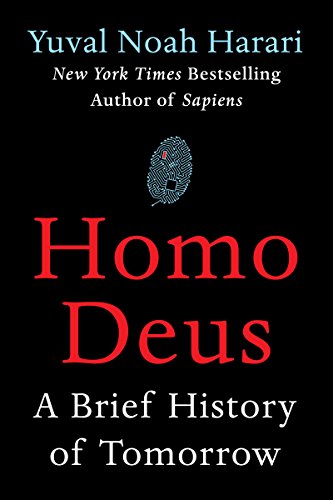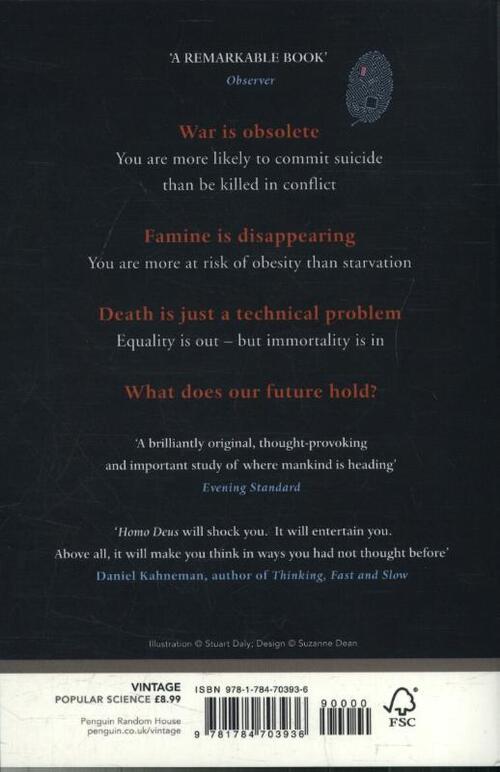
BOOK TITLE: HOMO DEUS | AUTHOR: YUVAL NOAH HARARI | PUBLISHER: VINTAGE | GENRE: NON-FICTION | WINGED RATING: 3/5
A Ph.D. in history from the University of Oxford, and a lecturer at the Hebrew University of Jerusalem, author Yuval Noah Harari writes a sequel to his international bestselling book Sapiens. Sapiens was all about how humankind has reached where it is today with a short glimpse of the future, whereas, Homo Deus is all about the future, where we as a human race are going ahead next collectively.
The first part of the book describes the relationship of humans with the other animals, in the second part, he talks about how humans got to believe that the world revolves around the humankind, in the third and the final part he tells the readers of the current predicaments of humanity and the future possibilities.
The book has a grand opening vividly describing the next human agenda to attain immortality, bliss, and divinity incorporating a plethora of examples and insights from the history, laboratory experiments, and technological advancement. He touches the subjects of upgrading humans into Gods following three biological paths: biological engineering, cyborg engineering, and the engineering of non-organic beings in huge detail.
“In the recent decades life scientists have demonstrated that emotions are not some mysterious spiritual phenomenon that is useful just for writing poetry and composing symphonies. Rather, emotions are biochemical algorithms that are vital for the survival and reproduction of all mammals.”
In the next chapters, you shall find factual answers to the usual questions such as how did Homo Sapiens become a superior life form? Did humans give meaning to the world? How did Humanism become the most important religion of all? Who might inherit humankind and what new religion might replace humanism?
The author also talks about the relationship shared between science and religion all the while, their disputes, how they support and balance out each other, and writes the importance of each one of them in supporting the humankind to reach where it is today.
“The Sumerian gods fulfilled a function analogous to modern brands and corporations. Today, corporations are fictional legal entities that own property, lend money, hire employees, and initiate economic enterprises. In the ancient cities of Uruk, Lagash, and Shurupak the gods functioned as legal entities that could own fields and slaves, give and receive loans, pay salaries and build dams and canals.”
The author has also covered the economic, social, and political implications of the creed throughout the book. He discusses the three most widely applied theories of liberalism, communism, and capitalism and draws conclusions based on the same. The books gradually progress with the new goals set by the humankind and the eventual result or let’s say its end, giving way to new gods, and new non-organic species to take over the world.
“Sapiens evolved in the African savannah tens of thousands of years ago, and their algorithms are just not built to handle twenty-first-century dataflow.”
“We may successfully upgrade our bodies and our brains, while losing our minds in the process. Indeed, techno-humanism may end up downgrading humans. The system may prefer downgraded humans not because they would possess any superhuman knacks, but because they would lack some really disturbing human qualities that hamper the system and slow it down. As any farmer knows, it’s usually the brightest goat in the flock that stirs up the most trouble, which is why the Agricultural Revolution involved downgrading animal’s mental abilities.”
The book is insightful, nevertheless, in my opinion, it is not on par with Yuval’s first book Sapiens. Having said this, those who have read Sapiens should put this up in their next ‘to read’ list. And for those who haven’t read the first book, you too can pick this book and move on to connecting dots by reading Sapiens later. The book makes you reflect upon your existence and everything around all the while. It is not worth missing.

Price: INR 499 / £8.99
Review by: Nazneen Kachwala
The review virtually took me into the contents. Distinguishing a mind from the brain is a fact I wasn't educated on earlier. Will read the book at the earliest opportunity. My thanks to Nazneen for sharing her experience.
Amal Mohanty
Very good Review.. Life has existed since a million of years. But when it will cease to exist. Remains unanswered.
Moiz Zakki Barodawala.
Leave a comment